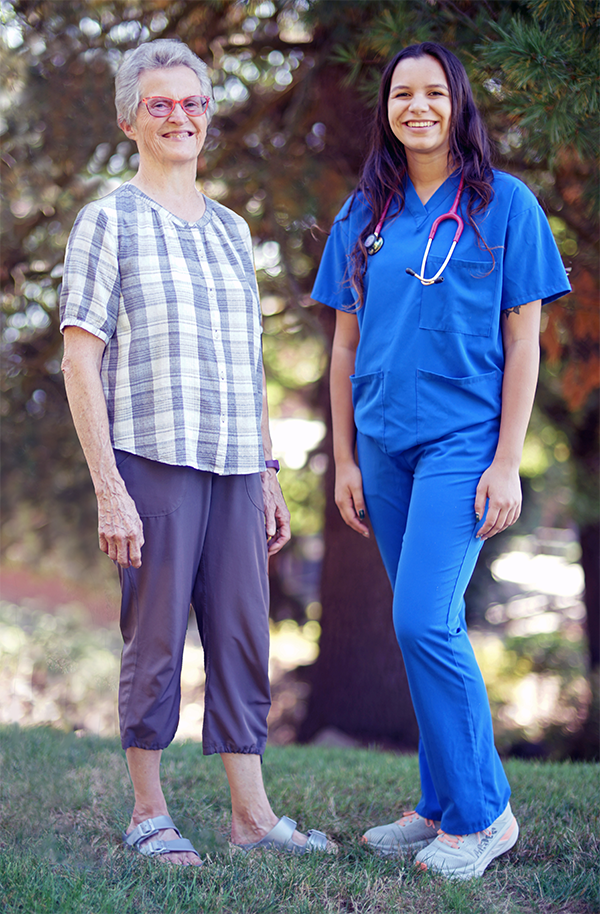
A new mentoring program aims to encourage and support nursing students through their educational journey.
“The idea of mentoring at nursing started before Covid in a conversation with Linda Campbell, followed by a long delay and then we returned to the idea early last winter,” said Monica Monroe, who leads the nursing student mentoring program. “It was in (her) heart as shown through her experience, that students can benefit from mentors who are not faculty or staff but can enter the setting as ‘neutral’ supporters and people they can go to with concerns or frustrations.”
Campbell is the Dean and Professor of Nursing at Warner Pacific University.
“It was on my heart to have a mentoring program, but (Monroe) just walked in and said yes,” Campbell said. “It took us an entire semester to plan it. And a semester to talk it up.”
Part of that planning included thinking about who else may be a good fit for the endeavor.
“Our first move was to recruit some others to join me,” Monroe said. “Cindy Pollard, WP alum and former employee and Patty Deacon, a retired nurse, were both willing to jump in.”
Pollard has strong ties to WPU, where she earned her bachelor’s and master’s degrees, and was an employee for 24 years. She was the Director of Student Accounts and Financial Aid, and an instructor. She retired in 2020 to care for her husband, who was battling Parkinson’s Disease.
“I am the mother of a son who works for Kaiser and Providence as a CRNA (Certified Registered Nurse Anesthesiologist),” Pollard said. “I know this is a difficult course of studies and we all need someone to breathe positivity into our goals.”
Deacon enjoyed a 44-year career in nursing at Legacy Health and was eager to support the next generation of nurses.
“Nursing is a valued career option and necessary for our community,” Deacon said. “The opportunities for students to explore within nursing are broad which allows for individual strengths and preferences. It is a privilege to encourage and support students who are pursuing their nursing degree.”
While the women involved say they did have encouragement during their education, none had the type of mentoring they hope to provide through this program.
“We are not paired with students,” Monroe said. “Those connections evolve with time. We brought pizza and mingled with students. We wrote notes and included personal contact information, that we handed to students that were interested in what we had to offer.”
Program Manager for Nursing, Kathleen Finch, helped facilitate interactions by letting the mentors know when students were in the building.
“We would hang out for two to three hours and open conversation,” Monroe said. “In May during a testing time we brought food to the common area and spoke words of kindness and encouragement. Students were nervous and anxious!”
As the program develops, the trio may shift their approach to the needs and preferences of the students.
“One day we three stepped into a classroom where a few students were sitting in despair and sadness because they had failed an exam,” Monroe said. “We listened and said what we could to help them see that this was a temporary situation, and they would overcome the obstacle. Tears flowed and having people who listened and cheered them on seemed to ease the situation.”
The experience was a positive experience for the mentors as well.
“Being able to be onsite and talk with students, especially following challenging exams, was rewarding,” Deacon said. “Sometimes it is good to have a neutral person to talk with in order to help move on to the next challenge.”
Though the mentoring program is still in its early stages, they have already been able to see students make it through to graduation.
“At (the Pinning Ceremony) in May we saw some of those who were struggling on that test fail day,” Monroe said.
Each of the mentors has enjoyed connecting with students and looks forward to continuing this work.
“We are trailblazers for this program and for now are in a trial-and-error period learning what works and doesn’t work,” Monroe said. “The key is to be present and build relationships. Our first event was to sit in a room with students who were invited to meet us. Each of us talked about our life journeys and why we were interested in being mentors. There was time allowed for questions directed to each of us.”
Pollard said she thinks sometimes just being present with a student helps keep them motivated.
“I also think that it isn’t always necessary to spend a lot of time,” Pollard said. “As in my experience, a sentence of encouragement carried me a long way in staying the course and finishing both my undergraduate and graduate degrees. I hope I have been able to do that for our WP students, and I hope that will be a reality in the future.”
A mentorship program was not available to Deacon either when she was in school, but she and a group of other nursing students supported each other.
“As a nursing leader I had opportunities to precept nursing students in their leadership rotation,” Deacon said. “It was always a highlight for me to encourage students, share my knowledge and see the profession through their eyes and life experiences. I consider my nursing career as a calling and treasure the patients, families, and team members I was able to work with. It is a joy to experience the excitement of WPU nursing students as they fulfill their dream to become the nurses of tomorrow.”
